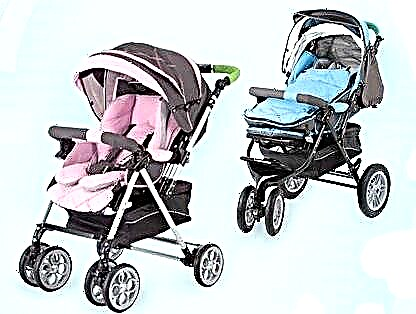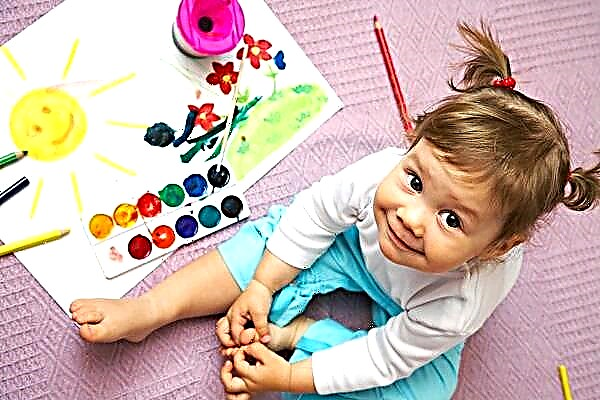If a small child has a stomach ache and is nauseous, parents should take this very seriously and not rely on the fact that it could be due to overeating or temporary indigestion. Even not very severe poisoning, which is not accompanied by a temperature, is extremely dangerous for a small organism. All parents need to know what can cause vomiting and diarrhea in a child, and understand how to act to help the baby.

Baby sitting on a potty
Nausea, diarrhea, and vomiting in a newborn
When the first signs of nausea, vomiting and diarrhea appear in a child, it is important for parents to understand what could trigger the onset of such a condition. If the crumbs vomit, you need to remember what food he ate over the last day, and pay attention to how vomit and feces look like. High fever is of particular importance - it almost always means that the baby has an inflammatory process or infection.
Important! If a baby is not feeling well, you should immediately call a doctor at home, since only a doctor can make a correct diagnosis and rule out more serious diseases.
Disease symptoms
In the event of vomiting and diarrhea, general symptoms may be absent, since they are not separate pathological processes, but are considered a consequence of a specific disease. The characteristic of the clinical picture always depends on the underlying factor that influenced the general well-being.
In a newborn baby, vomiting and diarrhea very often occur due to the development of intestinal infections or food poisoning. Such conditions have certain symptoms:
- The baby's temperature has risen sharply;
- The child suffers from nausea and vomits frequently;
- The crumb refuses to eat food, since everything eaten by him immediately comes out back in the form of vomit;
- The baby has changed the consistency and color of the feces, normal newborns' stool is a yellow mushy mass. In case of poisoning or intestinal infection, feces may turn green, contain an admixture of mucus, blood clots, pieces of undigested food;
- Bile is present in the vomit;
- The baby has a stomach ache, and this manifests itself in the form of moodiness, crying, bending legs to the stomach.
In a more complex case, the following clinical manifestations may be added to the above symptoms:
- The child does not pee for more than six hours and cries without tears;
- Due to severe and very frequent vomiting, the baby may faint;
- Skin color may change - it will become pale, wrinkled, dry to the touch;
- Blood streaks may appear in the stool.
Note! Vomiting and diarrhea severely deplete a child's body and can cause dehydration. If such phenomena occur, it is necessary to start treatment as soon as possible, since sometimes the count goes not for days, but hours, and the child's life is at risk.

The child has nausea
Why are diarrhea and vomiting dangerous?
The main risk in the appearance of vomiting, which is combined with diarrhea, is dehydration. These two symptoms provoke pathological loss of fluid and mineral salts, lead to an imbalance in the body and impairment of the functioning of all organs. The younger the child, the more dangerous such losses are for his body.
If the baby is not provided with timely assistance, the following complications are possible:
- At high temperatures, there is a risk of developing seizures. This condition is very dangerous, as it can cause coma and even death;
- If vomiting and diarrhea have arisen due to dysbiosis, then this can cause the appearance of dermatitis, disturbances in the work of all organs of the gastrointestinal tract, as well as bronchial asthma;
- With diarrhea and vomiting, which occur due to frequent food poisoning, complications such as gastritis and flatulence are possible;
- Intestinal infections often cause toxic damage to the central nervous system, cerebral edema and sepsis;
- Untreated dysentery can cause arthritis, stomach and intestinal bleeding, anemia, pneumonia and other disorders in all organs.
Important! Due to frequent diarrhea and vomiting, dehydration develops very quickly in young children, without appropriate treatment, this can lead to irreversible consequences.

Baby vomited
For small children, severe vomiting is very dangerous, because it does not make it possible to take the medicine normally and very quickly leads to dehydration. Vomiting and diarrhea in infants cause disturbances in the functioning of the brain, heart, and kidneys. Due to dehydration, the death of brain cells is possible, the load on the heart increases, the kidneys no longer cope with their functions.
Possible reasons
Diarrhea and vomiting in a child can confirm the presence of certain diseases in the body. The reasons for the appearance of such symptoms can be not only those factors that are associated with food, but also other phenomena associated with reduced immunity or other diseases of internal organs.
Note! To quickly eliminate nausea and diarrhea, to improve the general condition of the child, the cause of these symptoms should be identified as soon as possible.

The baby has severe diarrhea
Non-infectious factors
Abdominal pain and vomiting in an infant may appear due to the influence of such factors:
- Eating poor quality food. In this case, diarrhea and vomiting in a child become the first signs of poisoning;
- Poor tolerance to certain drugs, foods or complementary foods. In this regard, the baby may vomit, and he will have diarrhea;
- Violation of microflora in the stomach and intestines due to the intake of antibacterial agents;
- Manifestation of stomach diseases: gastroesophageal reflux, pylorospasm, gastritis, intestinal intussusception, duodenitis, pyloric stenosis and others. The temperature does not rise in this case;
- Pathology of the gallbladder;
- CNS pathology;
- A brain tumor or a surge in intracranial pressure;
- Foreign object in the digestive tract;
- Stress, strong emotional experience, fear and resentment;
- Teething. Very often during this period of life, children begin to get sick;
- Improper unbalanced diet. Because of this, the baby may have a stomach ache;
- Change of climatic conditions.

The kid is sitting on the pot
Infectious factors
If a child has a stomach ache and vomiting, then this may be a manifestation of infectious diseases, such as:
- Dysentery;
- Escherichiosis;
- Salmonellosis;
- Pneumonia;
- Otitis;
- Meningitis;
- Pharyngitis;
- Rotavirus.
Signs that a child has one of the above infections are not only vomiting and diarrhea, but also a high fever. Very often it can rise up to 40 degrees.
How to prevent stomach pain and nausea
It is much easier to prevent abdominal pain, nausea and vomiting in a baby than to try to normalize his health. All parents should know the preventive measures and follow them exactly.
Pediatricians advise parents to:
- Organize an age-appropriate diet. Make sure that it is observed by the crumbs;
- Remove all junk food and drinks from the baby's diet;
- To teach the child to wash his hands before each meal, upon arrival from the street, after the toilet;
- Make sure that the baby only eats high-quality products;
- Dishes prepared for the baby should be fresh;
- Organize the correct drinking regime;
- In the presence of chronic pathologies of the gastrointestinal tract, periodically give medications prescribed by a doctor that will help maintain the normal functioning of organs;
- Treat infections and inflammatory diseases in time;
- Observe the regularity of the child's bowel movements;
- Undergo preventive examinations.

Mom wipes the baby's mouth
What absolutely must not be done
Pediatricians and gastroenterologists warn that if vomiting and diarrhea occurs in a child, it is strictly forbidden to:
- Leave the baby alone, because he can choke on vomit during the next attack. It is very important that someone is with the baby all the time;
- Limit the use of pure water, as this can provoke dehydration and the appearance of some symptoms characteristic of this condition (disturbed heart rhythm, fever, disturbance of consciousness);
- Apply a heating pad to the tummy. If vomiting is due to appendicitis, heat can cause inflammation;
- Putting ice on the baby's stomach;
- Feed the baby if the vomiting has not stopped;
- Self-rinse the baby's stomach;
- Ignore the poor condition of the baby;
- Provide sugary foods or drinks.
Additional Information. If your baby is vomiting severely, there is no need to give him any oral medication. Wrong actions by parents can lead to a deterioration in the child's condition, the development of complications of the disease.

The child must drink plenty of water
Which doctor to contact
If vomiting and diarrhea occurs in a baby, you should immediately contact a pediatrician. He will refer you to a gastroenterologist, give a referral for the delivery of feces, urine and blood tests. You may need to undergo an ultrasound of the abdominal cavity in order to exclude the pathology of the internal organs.
Preventive actions
Diarrhea in an infant is a commonly diagnosed gastrointestinal problem. If you find unpleasant symptoms, do not panic, it is better to adhere to the doctor's recommendations and not repeat the mistakes associated with the baby's eating. Compliance with the rules of complementary feeding, feeding, hygiene and the quality of nutrition of the crumbs will help prevent the appearance of vomiting and diarrhea in a child.
Parents should adhere to these recommendations:
- Eggs, milk, fish, meat must always be thermally processed well;
- It is best if the dishes for the child are baked, boiled, stewed or steamed;
- Wash vegetables and fruits well under running water;
- Give the child bottled water, purified or boiled;
- Prepare food from fresh ingredients;
- Forcing the child to wash their hands every time after a walk, toilet, playing with animals, before eating food;
- When breastfeeding, the mother must follow a diet;
- Gradually introduce complementary foods in accordance with the recommendations of the pediatrician;
- The mixture must be chosen one that will be suitable for artificial feeding;
- Strengthen immunity regularly to avoid infections;
- Provide a favorable psychological atmosphere in the house.

The baby's food must be clean and fresh.
Traditional medicine recipes
It is possible to eliminate diarrhea and vomiting in a child using traditional medicine recipes in agreement with the attending doctor.
Rice broth
Boil 100 g of rice in unsalted water, drain. Cool the broth to a warm state and give the child to drink several times a day: for babies up to one year old - 1 tbsp. spoon 3-4 times a day, children from one to three years old - 1/4 cup three times a day, older children - 0.5 cup three times a day. Diarrhea can be eliminated with rice water in a few days.
Homemade rehydration fluid
This remedy will help normalize the water-salt balance in the child's body, which is disturbed by frequent liquid bowel movements. If the baby has diarrhea, and there is not a single packet of "Regidron" in the home medicine cabinet, or there is no opportunity to urgently buy it at the pharmacy, you can prepare the medicine yourself.
Take sugar (1 tablespoon), salt (1 teaspoon) and 1 tbsp. boiled water cooled to room temperature. Stir all this and give the child a few sips every 15 minutes. This remedy is suitable for both newborns and children 2-5 years old.
Bananas
These fruits, beloved by children, contain a lot of potassium, it is its lack that manifests itself in the body as a result of diarrhea. In addition, parents do not need to persuade their child to take medicine, bananas are very tasty and healthy. Every hour you need to give the baby one ripe fruit. If the crumb still does not know how to chew food well, you need to chop the banana pulp in a blender and let the baby eat the resulting puree. You should not drink or eat a banana with anything. Usually the fruit does a good job of relieving diarrhea in one day.
Baked apples
This is another delicious and very pleasant method to relieve the crumb of diarrhea. You need to bake apples in the oven and give one piece every hour.
Others
Chamomile or mint tea will help with diarrhea. Pour boiling water over a spoonful of the mixture. Insist for half an hour and give the child to drink 1 teaspoon every 15 minutes. This tool is able to remove discomfort in the abdomen, eliminate intestinal failure. You can help restore normal bowel function with hawthorn infusion. You need to take after the disorder.
Boiled steamed dishes should prevail in the child's diet. The frequency of receptions must be increased, the portions must be reduced. You can return to the previous diet in a week.
Important! Diarrhea and vomiting in a child can have different causes. Most often, the disorder in children appears due to overeating, intestinal infection and poor-quality food. If stool disturbance and nausea are accompanied by fever and abdominal pain, then you should immediately consult a doctor. Parents should know that you can use folk remedies after consulting a gastroenterologist.
It is important for parents to know what to do if a small child has diarrhea and vomiting, how to give him first aid, what to feed, how to treat. These symptoms are dangerous at any age, but most complications occur in children under three years of age. This fact should make parents be more alert to the health of their baby.



